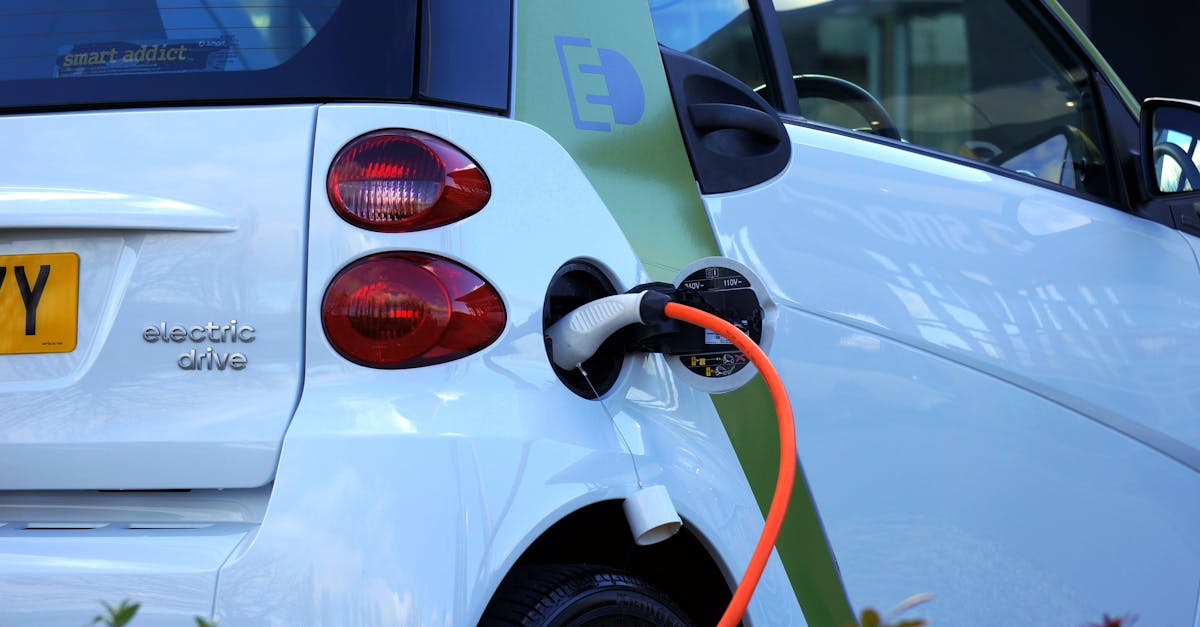The Electric Revolution: Pioneering a Greener Path Forward

As we stand on the cusp of a transformative era in transportation, the world is abuzz with the promise of eco-friendly vehicles leading the charge in a post-fuel car landscape. This shift is not merely a trend but a profound pivot towards sustainable, efficient, and environmentally conscious mobility. The surge in electric vehicles (EVs) and the infrastructure powering them marks an exciting chapter in the history of transportation, presenting opportunities for positive change at an unprecedented scale. With a palpable embrace of sustainable alternatives and the challenges that come with it, we are making strides towards a cleaner, greener future for all. From policy initiatives to the economic and environmental impacts, this article delves into the multifaceted story of this pivotal transition, serving as a guidepost for navigating the evolving landscape of eco-friendly transportation.
1. The Shift to Eco-Friendly Transportation
Thank you for reading this post, don't forget to subscribe!
The shift to eco-friendly transportation represents a pivotal moment in the history of mobility, one that is defined by an encouraging wave of change aimed at addressing the pressing need for sustainable solutions. With a rising global awareness of environmental issues such as climate change and air pollution, there is a growing understanding of the imperative to transition towards cleaner, greener modes of transport. This movement is not just about replacing traditional gasoline-powered vehicles; it symbolizes a broader paradigm shift, promoting innovation, technological advancement, and responsibility for our planet’s well-being. Embracing this change entails a positive narrative—a story of hope and progress rooted in our collective commitment to fostering a healthier world.
As we delve into this encouraging shift, it’s crucial to recognize the need for change as an opportunity for transformative growth. The evolving landscape of eco-friendly transportation encompasses a diverse array of solutions, from electric vehicles and sustainable fuels to enhanced public transport systems and active transportation initiatives. This diversity not only presents us with alternatives but also encourages a holistic approach, highlighting the interconnectedness of urban planning, infrastructure development, and technological innovation in shaping a brighter future for transportation. Each step taken towards eco-friendly transportation underscores a shared vision of progress and resilience, promising a future where cleaner, more efficient modes of travel are not just a luxury but a standard feature of our daily lives.
2. Rise of Electric Vehicles (EVs)

The rise of electric vehicles (EVs) marks a monumental leap forward in our journey towards sustainable and efficient mobility, offering an encouraging glimpse into a future powered by clean, renewable energy sources. This paradigm shift heralds a new era where transportation is not just a means of getting from point A to point B, but a driver of environmental stewardship and technological innovation. As the world grapples with the challenges of climate change and environmental degradation, the rapid uptake of EVs represents a beacon of hope, showcasing our collective resolve to embrace solutions that reduce carbon emissions while enhancing the overall quality of urban living.
Embracing the transition towards electric vehicles goes hand in hand with our aspiration for a cleaner, healthier planet. The myriad advantages of EVs extend beyond reduced emissions; they bring forth a promise of economic savings, energy independence, and a quieter, more sustainable urban landscape. The encouraging momentum towards EV adoption is no longer confined to niche markets but has permeated mainstream consciousness, signifying a momentous shift in consumer preferences and industry dynamics. This shift is not merely about replacing conventional cars with electric alternatives, but rather an empowering movement that reshapes the very essence of transportation, steering it towards a more promising and environmentally regenerative trajectory.
As we witness the encouraging embrace of electric vehicles, it becomes evident that this evolution embodies not just a technological phase transition, but a profound societal and cultural transformation. The warmth of this change shines brightly as communities, businesses, and governments come together to foster the infrastructure, policies, and attitudes required to accelerate the adoption of EVs.
EV Adoption Trends
The adoption of electric vehicles (EVs) has been on an encouraging upward trajectory, reflecting a significant paradigm shift in the automotive industry and consumer mindset alike. The growing popularity and accessibility of EVs not only signal a transformative change in our approach to transportation, but also underscore a fundamental redefinition of our relationship with the environment and sustainable technology. With advancements in EV technology and a surge in charging infrastructure, the barriers to entry for embracing electric mobility are steadily diminishing. This trend not only speaks to the inherent appeal of clean, efficient transportation but also signifies a collective affirmation of our responsibility towards reducing carbon emissions and curbing reliance on finite fuel sources.
The surging interest in EVs is not merely a passing fad; it resonates as a heartening reflection of changing consumer behavior and an expanding global appetite for sustainable, forward-thinking alternatives. As governments, corporations, and consumers alike recognize the undeniable advantages of electric vehicles, a tangible wave of support is materializing, nurturing an environment conducive to further growth and innovation in the EV segment. This surge in popularity is bolstered by an increasing array of models across various vehicle segments, as well as a concerted effort to make EVs more accessible through incentives, subsidies, and evolving charging infrastructure.
Advantages of EVs
Electric vehicles (EVs) offer a myriad of encouraging advantages, anchoring their position as the vanguard of sustainable and efficient mobility. One of the most striking benefits lies in the realm of environmental impact: the widespread adoption of EVs holds the promise of significantly reducing greenhouse gas emissions and curbing air pollution, thereby fostering cleaner and healthier urban environments. By transitioning to EVs, we pave the way for a future where our daily commutes no longer contribute to the degradation of our planet, but rather become a part of the solution, infusing every journey with a sense of positive environmental stewardship.
In addition to their environmental credentials, EVs present an encouraging narrative of cost savings and economic prudence. With the price of battery technology steadily declining and the overall operational and maintenance costs being notably lower than those of conventional vehicles, the promise of saving money via EV ownership is increasingly becoming a reality. Moreover, governmental incentives, tax rebates, and reduced fuel costs further elevate the financial appeal of electric vehicles, enabling consumers to make not just an environmentally conscious choice, but also a financially astute one.
The encouraging advantages of EVs extend beyond individual consumers to encompass businesses, public entities, and entire communities, further solidifying their position as a transformative force in the transportation sector. With a focus on sustainability, efficiency, and a zeal for reducing our carbon footprint, EVs emerge as not just a mode of transport, but a hallmark of our commitment to fostering a cleaner, greener world.
3. Challenges and Solutions
Transitioning to eco-friendly vehicles presents a series of challenges that require innovative and encouraging solutions. Among the most prominent hurdles is the pressing need for robust infrastructure development, particularly in terms of expanding charging stations and advancing battery technology. The encouraging news is that around the world, governments, private enterprises, and energy industry leaders are swiftly addressing this need, catalyzing the establishment of widespread charging networks, along with research and development efforts aimed at improving battery efficiency, range, and durability. As these solutions gain momentum, they promise to reshape the very framework of our transportation landscape, ensuring that the transition to eco-friendly vehicles is not just feasible, but increasingly convenient and accessible.
Another notable challenge lies in consumer education, as the intricacies of owning and maintaining eco-friendly vehicles may seem daunting at first. However, this obstacle presents an opportunity for enlightenment and empowerment. Efforts to simplify the ownership experience through accessible information, user-friendly interfaces, and readily available support services are key to alleviating any apprehensions associated with transitioning to eco-friendly vehicles. With a concerted focus on enhancing consumer awareness, the road to embracing eco-friendly vehicles becomes less daunting and more appealing, fostering a sense of assuredness and enthusiasm among prospective adopters.
As we confront these challenges head-on, it’s imperative to recognize that each obstacle presents a chance for creative problem-solving and positive change. The recognition of these difficulties paves the way for inspiring solutions, as we collectively embrace the task of nurturing an eco-friendly transportation ecosystem that is not just desirable, but also practical and seamless in its implementation.
Infrastructure Development
Infrastructure development is at the heart of the encouraging transformation towards eco-friendly vehicles, particularly in the context of expanding charging stations and advancing battery technology. The seamless integration of extensive charging networks within urban, suburban, and rural landscapes represents a pivotal stride towards normalizing electric vehicle (EV) adoption. Governments, private enterprises, and energy industry leaders continue to collaborate on ambitious initiatives aimed at rapidly increasing the density and accessibility of charging infrastructure, effectively quelling any concerns related to range anxiety and ensuring that EV drivers have the confidence to embark on longer journeys. As this network expands, it fosters a sense of liberation, positioning eco-friendly vehicles as not just a practical choice, but an encouragingly convenient one as well.
In parallel to charging infrastructure, the evolution of battery technology stands as a beacon of optimistic progress, promising enhanced efficiency, performance, and longevity for electric vehicles. Research and development efforts in the energy sector continue to drive innovation, accelerating the transition towards more sustainable and scalable battery solutions. Encouraging breakthroughs in battery tech not only extend the range and reliability of EVs but also set the stage for broader applications in renewable energy storage, grid resilience, and portable electronics, underpinning a future where clean energy technologies play a central role in everyday life.
The expansion of charging stations and the refinement of battery technology offers a hopeful vision of a future where eco-friendly vehicles are seamlessly integrated into our daily lives, driving us towards cleaner, more sustainable modes of transportation while fostering a sense of optimism and empowerment for a greener world.
Consumer Education
Consumer education plays a pivotal role in the encouraging and seamless transition to eco-friendly vehicles, particularly in simplifying electric vehicle (EV) ownership and maintenance. As the market for EVs expands, there exists a growing need to demystify the process of owning and maintaining these vehicles, ensuring that prospective buyers are equipped with the knowledge and confidence necessary to make informed decisions. Efforts from manufacturers, dealerships, and advocacy groups have been instrumental in providing accessible resources, user-friendly documentation, and interactive platforms that offer valuable insights into the nuances of EV ownership. This approach not only empowers consumers but fosters a sense of enthusiasm and assurance, positioning eco-friendly vehicles as not just a choice, but a clear, accessible path to sustainable driving.
In addition to simplifying ownership, the focus on consumer education extends to the realm of maintenance, where the differences and benefits of EV upkeep are highlighted. With straightforward guides, instructional videos, and community forums, potential EV owners are encouraged to embrace the simplicity and cost-effectiveness of maintaining electric vehicles. The shift towards electrified transport not only brings about a change in the way we drive, but also in the way we approach vehicle maintenance, presenting an optimistic outlook on the extent to which eco-friendly vehicles seamlessly integrate into everyday life. As prospective owners are assured of the straightforwardness and benefits of EV maintenance, they are greeted with a landscape that is not just welcoming but also encouraging in its ease and accessibility.
4. Policy and Industry Initiatives

Policy and industry initiatives are at the vanguard of an encouraging revolution in sustainable transport, steering us towards a brighter, greener future. Governments worldwide, in collaboration with industry stakeholders, are enacting bold, forward-thinking policies aimed at accelerating the adoption of eco-friendly vehicles, promoting renewable energy sources, and fostering transportation models that are both efficient and environmentally responsible. From ambitious targets for electric vehicle (EV) market share to investments in charging infrastructure and clean mobility incentives, these initiatives reflect a profound commitment to redefining our approach to transportation, ushering in an era where sustainability is not just a guiding principle but a tangible, encouraging reality.
Simultaneously, industry leaders continue to drive this wave of optimistic change, with groundbreaking innovations in vehicle technology, battery efficiency, and renewable energy integration. Encouragingly, these advancements are not just exclusive to EV manufacturers, but also permeate through related sectors such as energy, infrastructure, and urban planning, creating a synergistic landscape wherein a multitude of industries collaborate to foster a sustainable and holistic transformation of our mobility ecosystem. As these developments proliferate, a palpable sense of possibility and excitement surrounds the evolution of sustainable transport, inspiring confidence in the collective effort to shape a transportation paradigm that is both efficient and environmentally harmonious.
The confluence of these encouraging policy and industry initiatives presents a beacon of hope, signifying a landscape where sustainable transport is no longer an idealistic notion but a tangible reality, driving us towards cleaner, greener modes of mobility, and fostering a promising narrative of positive change for generations to come.
5. Economic and Environmental Impact
The move towards eco-friendly vehicles bears an encouraging, far-reaching impact, rippling across economic and environmental spheres, and promising transformative change. From an economic standpoint, the proliferation of eco-friendly vehicles portends a surge of job opportunities and investment prospects, fueling innovation in green technology, manufacturing, and infrastructure development. The evolution towards electric mobility aligns with a shift towards sustainable economic models, as businesses and industries embrace the potential for growth, profitability, and leadership in a burgeoning sector that is both economically sound and environmentally responsible. Encouragingly, this transition signals not just a redirection of capital and resources, but a renaissance in economic resilience and prospects for long-term growth and stability.
Parallel to its economic implications, the environmental impact of embracing eco-friendly vehicles is equally encouraging, projecting a reduction in greenhouse gas emissions, fostered air quality, and a ripple effect towards a cleaner, more sustainable planet. The shift towards electric vehicles mirrors a broader trend in environmental conscientiousness, nurturing a landscape where efficient, low-emission, and renewable energy sources are cornerstones of day-to-day life. As eco-friendly vehicles become commonplace, they signify a commitment to environmental stewardship and a collective shift towards a more sustainable and regenerative coexistence with our planet, laying the foundation for a future where economic prosperity flourishes in harmonious synergy with environmental well-being.
The economic and environmental impact of eco-friendly vehicles fosters a narrative of promise, resilience, and forward momentum, painting a portrait of an interconnected realm where economic prosperity thrives alongside the nurturing of a healthier, more sustainable world.




